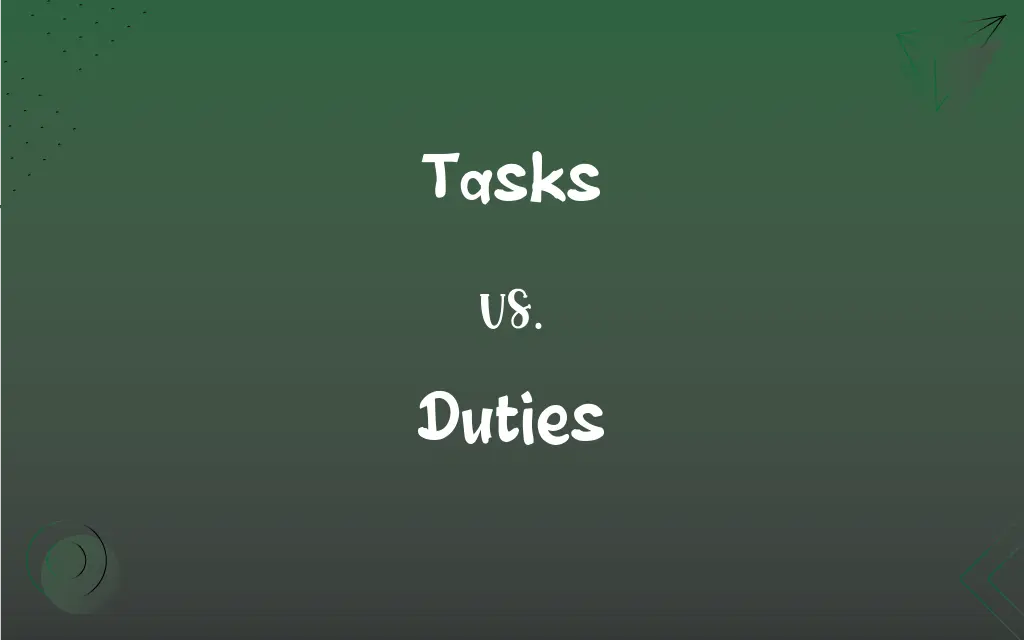Tasks vs. Duties: What's the Difference?
Edited by Harlon Moss || By Janet White || Published on December 6, 2023
Tasks are specific activities or pieces of work to be completed, while duties are responsibilities or obligations often tied to a role or position.

Key Differences
Tasks are specific assignments or activities undertaken to achieve a goal. They are often concrete and measurable, focusing on action and execution. For example, writing a report or designing a webpage. Duties, in contrast, are broader responsibilities or obligations that are generally associated with a role or position. They are more about the ongoing responsibilities one holds, like a teacher's duty to educate students or a doctor's duty to care for patients.
In the context of a workplace, tasks are often short-term and have clear objectives and deadlines. They can be part of a larger project or a standalone activity. For instance, coding a specific feature in a software application is a task. Duties, however, are more about the role one plays within an organization or society. For instance, a manager's duty might include overseeing a team's progress and maintaining team morale, which is not limited to a specific time frame.
Tasks can be delegated or distributed among team members based on skills and workload. They are often listed in a to-do list or a project management tool. For example, conducting market research or preparing a presentation. Duties are inherent to a person's role and are less likely to be delegated. They reflect the expectations and responsibilities that come with a position, such as a lawyer's duty to maintain client confidentiality.
Tasks often have a practical, hands-on nature and are typically focused on achieving tangible results. They can be part of one's duties but are more specific. An employee might have the task of submitting a weekly report. Duties are more abstract and encompass a range of behaviors and activities expected from a person in a certain role. For example, a police officer's duty includes upholding the law and protecting citizens, which involves many varied tasks.
Tasks are often specific and can be completed in the short term, allowing for immediate assessment and feedback. For example, resolving a customer's complaint is a task. Duties are ongoing and are often evaluated over a longer period. They represent a commitment to a set of values or principles related to a role, like a journalist's duty to report truthfully.
ADVERTISEMENT
Comparison Chart
Definition
Specific activities or work to be completed
Responsibilities or obligations tied to a role
Time Frame
Often short-term with clear deadlines
Ongoing, with no specific end point
Delegation
Can be delegated based on skills
Less likely to be delegated, tied to a role
Nature
Practical, focused on tangible results
Abstract, encompassing a range of behaviors
Evaluation
Assessed immediately after completion
Evaluated over a longer period
ADVERTISEMENT
Tasks and Duties Definitions
Tasks
A task is a duty or chore that you are obliged to perform.
His daily task includes updating the company's social media pages.
Duties
A duty is an obligatory task, action, or function.
Serving jury duty is an important civic responsibility.
Tasks
A task is an assigned piece of work often to be finished within a certain time.
Her task was to organize the conference within two weeks.
Duties
A duty is a moral or legal obligation.
It's our duty to vote in the national elections.
Tasks
A task is a piece of work that needs specific action for its completion.
Designing a new logo for the brand was a creative task.
Duties
A duty is a binding task linked to one's job or position.
As a teacher, her duty is to inspire and educate her students.
Tasks
A task is a specific piece of work required to be done.
Completing the annual budget report is my task for today.
Duties
A duty is a responsibility associated with a role or position.
One of her primary duties as a nurse is to provide patient care.
Tasks
A task is an undertaking requiring effort and diligence.
Researching for the new book was a challenging task.
Duties
A duty is a task or action that someone is required to perform.
His duty as the security head is to ensure the building's safety.
Tasks
A piece of work assigned or done as part of one's duties.
Duties
An act or a course of action that is required of one by position, social custom, law, or religion
The duties of being a critical care nurse.
Tasks
A difficult or tedious undertaking
Finding qualified people to fill these specialized roles was a real task.
Duties
Required action or service
Jury duty.
Beyond the call of duty.
Tasks
A function to be performed; an objective
It is our task to renew consumer confidence.
Duties
Active military service
A tour of duty.
Tasks
To assign a task to or impose a task on
The agency was tasked with creating an advertising campaign.
Duties
Moral or legal obligation
It is your duty to tell the truth.
Tasks
(Archaic) To subject to strain or hardship
"The Professor's household was a modest one, and yet it tasked his ideas to keep it up to his wife's standard" (Edith Wharton).
Duties
The compulsion felt to meet such obligation
Acting out of duty.
Tasks
Plural of task
Duties
A tax charged by a government, especially on imports.
Tasks
Infl of task
Duties
The application of something for a purpose; use
The dining room table also does duty as a desk.
Duties
A measure of efficiency expressed as the amount of work done per unit of energy used.
Duties
The total volume of water required to irrigate a given area in order to cultivate a specific crop until harvest.
Duties
Plural of duty
FAQs
How are duties evaluated?
Duties are evaluated over a longer period based on the fulfillment of ongoing responsibilities.
What defines a task?
A task is a specific activity or piece of work assigned to be completed.
Are all tasks deadline-driven?
Most tasks have deadlines, but some can be ongoing activities without a strict timeline.
Is delegation possible with duties?
Duties are less likely to be delegated as they are tied to a specific role or position.
Do duties reflect values?
Yes, duties often reflect the values and principles associated with a role.
Can a duty be a single action?
No, a duty is more about ongoing responsibilities rather than a single action.
Can tasks be part of personal life?
Yes, tasks can be personal like household chores or professional.
Can duties be shared?
Duties can be shared among people in similar roles or positions.
Are tasks always part of duties?
Tasks can be part of duties, but they are more specific and action-oriented.
Can duties change over time?
Yes, duties can evolve based on changes in role or societal expectations.
Are tasks always concrete?
Tasks are generally concrete with specific actions to be taken.
Do duties carry legal implications?
Some duties, especially in professional contexts, can carry legal implications.
How are tasks prioritized?
Tasks are prioritized based on urgency, importance, and deadlines.
Do duties require specialized skills?
Some duties require specialized skills, especially in professional contexts.
Do duties have a broader impact?
Yes, duties often have a broader impact, reflecting the significance of a role.
Are tasks always part of a job?
Tasks can be part of a job, but they can also be personal or voluntary.
Is there flexibility in performing tasks?
There can be flexibility in how tasks are performed, depending on the nature of the task.
Are duties influenced by cultural norms?
Yes, duties can be influenced by cultural, societal, and organizational norms.
Can tasks be spontaneous?
Tasks can be planned or spontaneous, depending on the situation.
Can a task become a duty?
A recurring task can evolve into a duty if it becomes a regular responsibility.
About Author
Written by
Janet WhiteJanet White has been an esteemed writer and blogger for Difference Wiki. Holding a Master's degree in Science and Medical Journalism from the prestigious Boston University, she has consistently demonstrated her expertise and passion for her field. When she's not immersed in her work, Janet relishes her time exercising, delving into a good book, and cherishing moments with friends and family.
Edited by
Harlon MossHarlon is a seasoned quality moderator and accomplished content writer for Difference Wiki. An alumnus of the prestigious University of California, he earned his degree in Computer Science. Leveraging his academic background, Harlon brings a meticulous and informed perspective to his work, ensuring content accuracy and excellence.































































